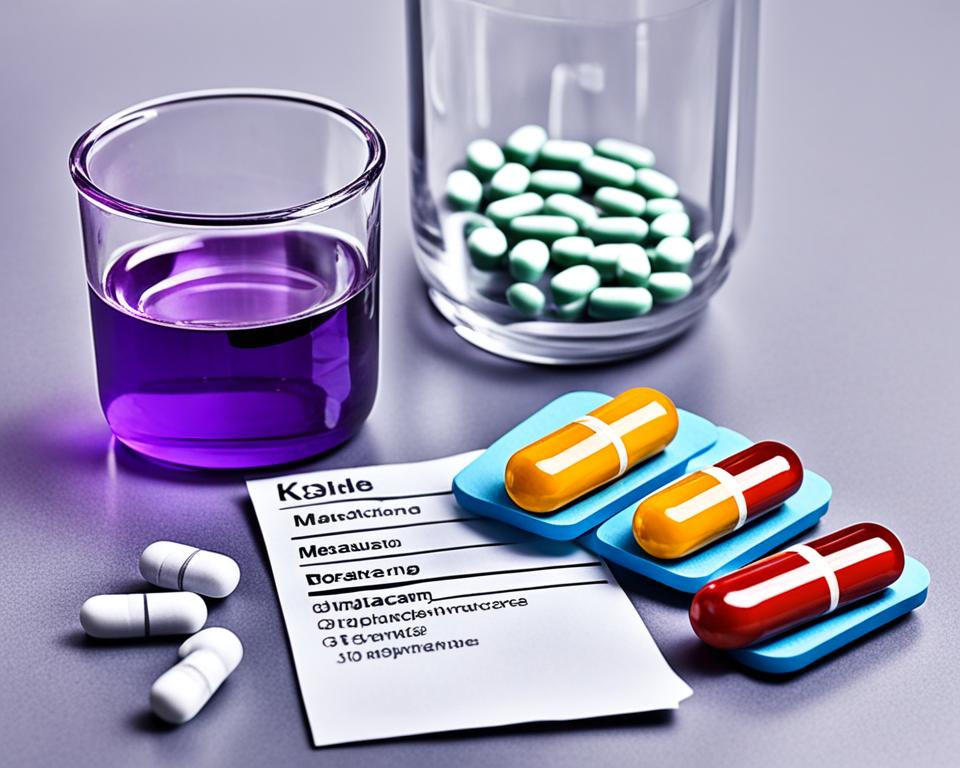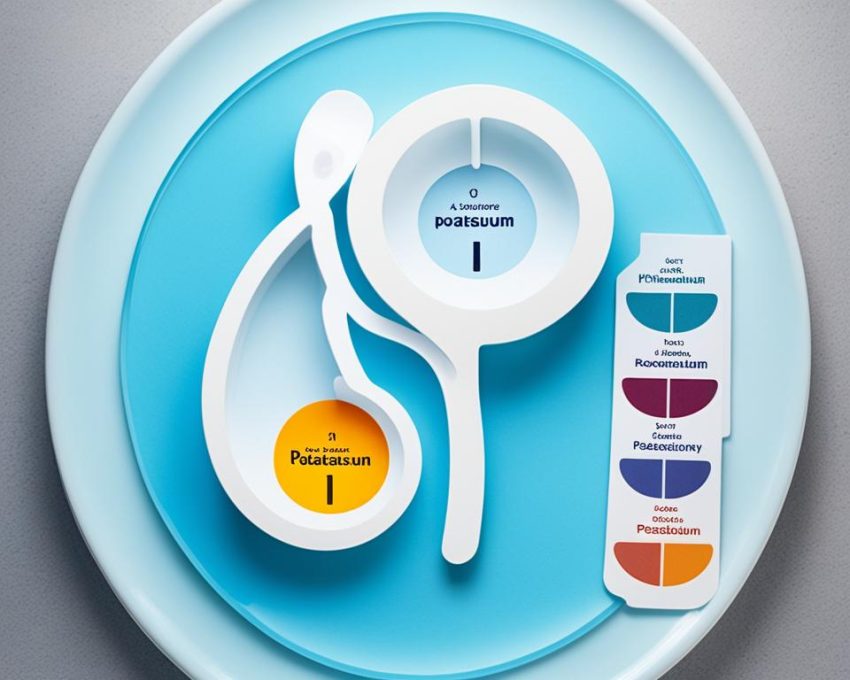Potassium is an essential mineral that plays a vital role in maintaining overall health, particularly for individuals with kidney disease. This comprehensive article explores the intricate relationship between potassium and kidney function, offering guidance on managing potassium intake to support optimal kidney health. By understanding the recommended potassium levels, identifying kidney-friendly foods, and recognizing the risks of hyperkalemia, readers will gain the knowledge necessary to navigate the complexities of a renal diet and effectively manage their condition.
Read interesting things at : mbp-kagawa
Key Takeaways
- Proper potassium intake is crucial for individuals with kidney disease to prevent complications like hyperkalemia.
- Potassium recommendations vary based on the stage of chronic kidney disease (CKD) and dialysis status.
- Monitoring potassium levels through regular blood tests and working with a renal dietitian are essential for managing potassium intake.
- Incorporating kidney-friendly, low-potassium foods into the diet can help maintain a healthy balance of this essential electrolyte.
- Addressing comorbidities like diabetes and hypertension, as well as making lifestyle modifications, can also support overall kidney health.
Understanding Kidney Disease and Potassium
Kidney disease, also known as chronic kidney disease (CKD), is a condition where the kidneys become damaged and unable to filter waste and excess fluids from the body effectively. This can lead to a buildup of various substances, including potassium, which is an essential electrolyte. Potassium plays a crucial role in maintaining proper muscle and nerve function, as well as regulating fluid balance and blood pressure. Understanding the relationship between kidney disease and potassium is essential for managing this condition.
What is Kidney Disease?
Chronic kidney disease (CKD) is a progressive condition that affects the kidneys’ ability to perform their vital functions. As the disease advances, the kidneys become less effective at filtering waste and excess electrolytes, such as potassium, from the bloodstream. This can lead to a buildup of these substances, which can have serious consequences for overall health.
The Role of Potassium in the Body
Potassium is an essential mineral that plays a crucial role in the body’s overall function. It is responsible for maintaining proper muscle and nerve function, regulating fluid balance, and supporting healthy blood pressure. However, in individuals with kidney disease, the body’s ability to effectively manage potassium levels can become impaired, leading to potential complications.
Potassium Intake Recommendations for Kidney Disease
The recommended potassium intake for individuals with kidney disease varies depending on the stage of the condition. In the early stages of chronic kidney disease (CKD), the kidneys may still be able to effectively regulate potassium levels, and a normal potassium intake may be appropriate. However, as the disease progresses and the kidneys become more impaired, strict potassium restrictions may be necessary to prevent a dangerous buildup of this electrolyte in the body, a condition known as hyperkalemia.
Stages of Chronic Kidney Disease
In the early stages of CKD, when kidney function is still relatively intact, a patient’s potassium intake may not need to be significantly restricted. As the disease advances, however, the kidneys become less able to effectively filter and excrete excess potassium, requiring more stringent dietary guidelines to maintain healthy potassium levels.
Dialysis and Potassium Restrictions
For individuals with end-stage kidney disease who require dialysis, managing potassium intake becomes even more critical. Dialysis helps remove excess fluids and waste products from the body, including potassium. However, the dialysis process can also lead to fluctuations in potassium levels, potentially causing either hyperkalemia or hypokalemia (low potassium). Healthcare providers and dietitians work closely with dialysis patients to closely monitor potassium levels and adjust dietary and medication regimens accordingly to maintain a healthy balance.
How Much Potassium Kidney Disease
Determining the appropriate potassium intake for an individual with kidney disease requires regular monitoring of their blood potassium levels. Healthcare providers may recommend specific potassium intake recommendations based on the stage of kidney disease and the individual’s overall health status.
Monitoring Potassium Levels
Regular monitoring of blood potassium levels is crucial for individuals with kidney disease. This allows healthcare providers to identify any imbalances and make necessary adjustments to the individual’s dietary and medication regimen to maintain healthy potassium levels.
Consulting with a Renal Dietitian
Working closely with a renal dietitian can be particularly helpful in developing a personalized dietary plan that ensures adequate nutrient intake while limiting high-potassium foods that could potentially cause complications. These professionals can provide valuable guidance on kidney-friendly foods and renal diet guidelines to help manage potassium levels effectively.
Kidney-Friendly Foods Low in Potassium
When following a kidney-friendly diet, it’s important to focus on foods that are naturally low in potassium. Some examples of kidney-friendly, low-potassium foods include apples, berries, broccoli, carrots, green beans, and certain grains like white rice and pasta. Incorporating these nutrient-dense, low-potassium options can help individuals with kidney disease maintain healthy potassium levels and support overall kidney function.
| Kidney-Friendly, Low-Potassium Foods | Potassium Content (mg per serving) |
|---|---|
| Apples (1 medium) | 95 |
| Blueberries (1 cup) | 114 |
| Broccoli (1 cup, cooked) | 290 |
| Carrots (1 cup, cooked) | 290 |
| Green beans (1 cup, cooked) | 180 |
| White rice (1 cup, cooked) | 55 |
| White pasta (1 cup, cooked) | 174 |
By incorporating these kidney-friendly, low-potassium foods into your diet, you can help support your overall kidney health and maintain proper electrolyte balance. Remember to always consult with your healthcare provider or renal dietitian to develop a personalized renal diet guidelines that meets your specific needs.

High-Potassium Foods to Avoid or Limit
For individuals with kidney disease, closely monitoring the potassium content of their diet is crucial to prevent the dangerous buildup of this electrolyte, known as hyperkalemia. Many common foods are naturally high in potassium and should be either avoided or consumed in moderation as part of a kidney-friendly diet and renal diet guidelines.
Fruits and Vegetables High in Potassium
Certain fruits and vegetables, such as bananas, oranges, tomatoes, and potatoes, are particularly high in potassium and should be limited or replaced with lower-potassium alternatives. These nutrient-dense foods may need to be consumed in smaller portions or less frequently to help prevent the buildup of potassium that can be harmful for those with kidney disease.
Protein Sources and Potassium Content
In addition to fruits and vegetables, some protein-rich foods can also be high in potassium. Red meat, salmon, and nuts are examples of protein sources that should be carefully monitored and potentially limited in the diets of individuals with kidney disease to help manage hyperkalemia prevention.
By being mindful of high-potassium foods and incorporating more kidney-friendly options, individuals with kidney disease can help maintain healthy potassium levels and support their overall renal diet guidelines.
Hyperkalemia: Risks and Symptoms
Hyperkalemia, or excessively high levels of potassium in the blood, is a serious concern for individuals with kidney disease. This condition can have severe consequences, as it can lead to potentially fatal cardiac arrhythmias and other life-threatening complications. It is essential for those with kidney disease to be aware of the symptoms associated with hyperkalemia, as prompt recognition and medical intervention can be crucial in restoring proper electrolyte management and preventing catastrophic outcomes.
Recognizing Signs of High Potassium
The symptoms of hyperkalemia can vary, but may include muscle weakness, nausea, irregular heartbeat, and shortness of breath. Individuals with kidney disease should be vigilant in monitoring their body for these signs, as they can indicate a dangerous buildup of potassium that requires immediate attention. Hyperkalemia prevention is essential, as the risks associated with this condition can be severe and potentially life-threatening.
If any of these symptoms are observed, it is crucial to seek medical attention without delay. Healthcare providers can quickly assess the situation and initiate appropriate treatment, which may include dietary modifications, medication adjustments, or other interventions to restore the body’s delicate electrolyte balance and prevent further complications.
Medication Management and Potassium Levels
Certain medications, such as diuretics and potassium-binding agents, play a significant role in managing potassium levels for individuals with kidney disease. Understanding the impact of these medications is crucial for maintaining appropriate potassium intake recommendations and electrolyte management.
Diuretics and Potassium Levels
Diuretics, which help the body eliminate excess fluid, can sometimes result in the loss of potassium, leading to low potassium levels (hypokalemia). Healthcare providers must closely monitor the use of diuretics in patients with kidney disease and make necessary adjustments to the medication regimen to prevent potassium depletion.
Potassium-Binding Agents
In contrast, potassium-binding agents work to remove excess potassium from the body, helping to prevent the dangerous condition of hyperkalemia. These medications are often prescribed to individuals with kidney disease to maintain appropriate potassium balance and support overall electrolyte management.
Healthcare providers will closely monitor medication regimens and make adjustments as needed to ensure patients with kidney disease maintain optimal potassium levels and overall electrolyte balance.

Electrolyte Balance and Kidney Health
Maintaining proper electrolyte balance, including sodium and fluid intake, is crucial for individuals with chronic kidney disease. Sodium and fluid intake must be carefully managed, as an imbalance can exacerbate kidney problems and contribute to the development of additional health issues, such as high blood pressure and fluid retention.
Sodium and Fluid Intake Considerations
Healthcare providers and renal dietitians work closely with patients to develop a personalized plan that addresses these important electrolyte management considerations and supports overall kidney health. By closely monitoring and adjusting sodium and fluid intake, individuals with kidney disease can help prevent further deterioration of their condition and maintain a better quality of life.
Potassium and Dialysis: Special Considerations
For individuals with end-stage kidney disease who require dialysis, managing potassium intake recommendations becomes even more critical. Dialysis helps to remove excess fluids and waste products from the body, including potassium. However, the dialysis process can also lead to fluctuations in potassium levels, potentially causing either hyperkalemia or hypokalemia.
Healthcare providers and dietitians work closely with dialysis patients to closely monitor potassium levels and adjust dietary and medication regimens accordingly to maintain a healthy balance. This requires a careful balancing act, as the removal of potassium during dialysis must be balanced against the potential for dangerous drops in potassium levels.
By collaborating with their healthcare team and adhering to personalized dietary and medication plans, dialysis patients can ensure that their potassium intake recommendations are tailored to their specific needs and stage of kidney disease. This comprehensive approach helps to prevent the complications associated with potassium imbalances and supports the overall health and well-being of individuals living with end-stage kidney disease.
Lifestyle Modifications for Better Kidney Health
In addition to dietary modifications, individuals with chronic kidney disease can also benefit from making lifestyle changes to support overall kidney health. Regular physical activity and exercise can help manage blood pressure, blood sugar levels, and other factors that can impact kidney function. Stress management techniques, such as meditation or yoga, can also be beneficial.
Exercise and Stress Management
Engaging in regular exercise, such as brisk walking, swimming, or low-impact aerobics, can help individuals with chronic kidney disease maintain a healthy weight, improve circulation, and reduce the risk of further kidney damage. Incorporating stress management practices, like deep breathing, mindfulness meditation, or guided imagery, can also alleviate the physical and emotional toll of living with kidney disease and contribute to better electrolyte management.
Smoking Cessation
Furthermore, quitting smoking is particularly important for individuals with chronic kidney disease, as smoking can accelerate the progression of the condition. Smoking not only harms the kidneys but also increases the risk of cardiovascular complications, which are common among those with kidney-friendly foods. By adopting a comprehensive approach that includes both dietary and lifestyle modifications, individuals with chronic kidney disease can better manage their condition and improve their quality of life.
Monitoring and Managing Comorbidities
Individuals with chronic kidney disease often have additional underlying health conditions, such as diabetes and hypertension, that can further impact their kidney function. Closely monitoring and managing these comorbidities is essential for preserving overall kidney health and preventing further disease progression.
Diabetes and Hypertension
Healthcare providers will work closely with patients to develop a comprehensive treatment plan that addresses the management of these concurrent conditions. This may include medication management, dietary modifications, and lifestyle changes targeted at controlling blood sugar levels and blood pressure. By taking a holistic approach to chronic kidney disease and electrolyte management, individuals can better control their disease progression and maintain optimal health.
Regular monitoring of key clinical indicators, such as blood glucose, hemoglobin A1C, and blood pressure, is crucial. Healthcare providers will work with patients to ensure that these comorbidities are effectively managed through a combination of pharmacological interventions and lifestyle adjustments. This comprehensive approach can help slow the decline in kidney function and reduce the risk of further complications.
In addition, patients may be referred to specialists, such as endocrinologists or nephrologists, who can provide specialized care and expertise in managing the complex interplay between kidney disease, diabetes, and hypertension. By collaborating with a multidisciplinary healthcare team, individuals with chronic kidney disease can optimize their treatment and improve their overall quality of life.
Potassium Supplementation: When Is It Necessary?
In some cases, individuals with kidney disease may require potassium supplementation to maintain adequate levels, particularly if they are unable to meet their potassium intake recommendations through diet alone. Healthcare providers will closely monitor an individual’s electrolyte management and only recommend supplementation when necessary, as excessive potassium intake can be dangerous for those with impaired kidney function.
The type and dose of potassium supplement will be carefully tailored to the individual’s specific needs and stage of kidney disease. Careful monitoring and adjustments to the supplementation regimen are crucial to ensure the appropriate potassium intake and maintain overall electrolyte balance.
| Potassium Intake | General Population | Chronic Kidney Disease | End-Stage Renal Disease (on Dialysis) |
|---|---|---|---|
| Recommended Intake | 4,700 mg/day | 2,000-3,000 mg/day | 1,500-2,000 mg/day |
| Supplementation Considerations | Not typically necessary | May be required if dietary intake is insufficient | Often required to maintain adequate levels |
By working closely with their healthcare team, individuals with kidney disease can develop a personalized plan to manage their potassium intake and electrolyte management, ensuring optimal kidney health and overall well-being.
Conclusion
In conclusion, managing potassium intake is a critical aspect of managing kidney disease. By understanding the role of potassium in the body, following recommended potassium intake guidelines, and incorporating kidney-friendly, low-potassium foods into the diet, individuals with kidney disease can help prevent the dangerous buildup of potassium, known as hyperkalemia, and support overall kidney health.
Regular monitoring of potassium levels, medication management, and a comprehensive approach to lifestyle modifications can also contribute to better outcomes for those living with chronic kidney disease. By working closely with healthcare providers and renal dietitians, individuals can develop a personalized plan to manage their potassium levels and improve their quality of life.
Maintaining a balance of electrolytes, including potassium, is essential for preserving kidney function and overall health. With a proactive and collaborative approach to managing kidney disease and potassium intake, individuals can take control of their condition and optimize their long-term well-being.



